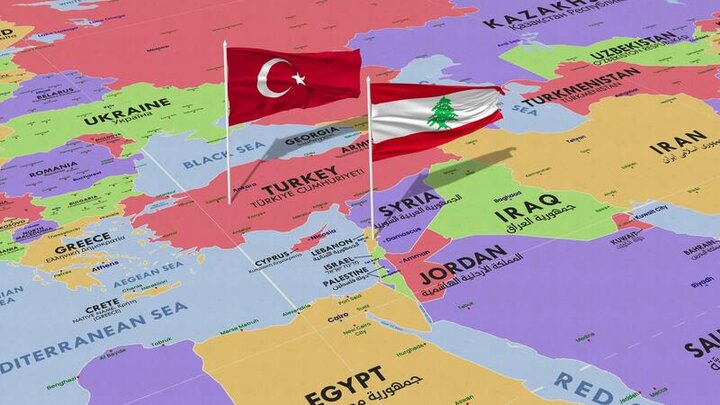Strategic Depth and ‘Blue Homeland’: What Is Turkey Doing in Northern Lebanon?

webangah news Agency, International Desk: In recent years, Turkey has pursued a long-term multifaceted strategy to expand its influence in northern Lebanon, particularly in Tripoli and Sunni-majority areas. This approach is grounded in concepts such as “strategic depth,” reflecting Turkey’s geopolitical reach due to its history and geographic position, and the maritime vision of “Blue Homeland,” which extends Ankara’s claims over parts of the Eastern Mediterranean. Leveraging ottoman-era historical ties-such as those with Lebanon’s ethnic Turkish communities-alongside soft power instruments, Ankara aims to strengthen its strategic presence. Analyses indicate that turkey seeks to consolidate footholds especially in Tripoli, Lebanon’s largest Sunni population center, supporting its influence through humanitarian and development agencies such as TİKA. Meanwhile, Lebanon’s political structure and governance weaknesses have created instability that leaves it vulnerable to foreign influence; within this environment, turkey presents itself as an active local player while viewing Lebanon as passive against these pressures.
Historical Context
Following Lebanon’s independence from the Ottoman Empire, bilateral relations have deep roots tied to shared history and ethnic Turkish populations living in northern Lebanon (estimated at approximately 19,000 Turkmen and 280,000 ethnic Turks). Over successive decades, Turkish governments have transformed these historical ties into strategic assets. As an example, under Ahmet Davutoğlu’s 2001 Strategic Depth doctrine, Lebanese Turkmen communities gained renewed importance as vehicles for extending Ankara’s regional sway. In 2010 Turkey established the Presidency for Turks Abroad (YTB) to support rights and welfare for Turkish migrants and related communities abroad.This historic focus on reviving Turkmen identity alongside engagement with traditional Sunni clans-for example residents of Tripoli’s Bab al-Tabbaneh district-reflects efforts to exploit Ottoman heritage and local subcultures.
Strategic Dimensions
Ankara views northern Lebanon as part of its traditional sphere of influence due chiefly to its proximity near Syria’s border along critical Mediterranean energy corridors. The port city of Tripoli serves as a key ‘vital link’ facilitating trade connections with Turkey within this context. from both maritime security and geopolitical perspectives, Ankara’s initiatives align with “Blue Homeland” ambitions asserting extended Turkish maritime zones across the Eastern Mediterranean Sea. Countering this expansion are regional coalitions like the East Mediterranean Consortium formed by neighboring states aiming to curb Turkey’s advances.
The growing presence of Turkey-backed factions in Syria also heightens northern Lebanon’s strategic value: notably after December 2024 changes when Hayat Tahrir al-Sham-a group allied with Ankara-explicitly demanded control over Tripoli and Lebanese borders.These shifts turn northern Lebanon into a crucial corridor for Turkish interests on its western frontier.
Mechanisms of Influence
Turkey employs various tools to consolidate power across northern Lebanon:
- Cultural Soft Power & Humanitarian Aid: Agencies like TİKA implement welfare projects including infrastructure upgrades around Sunni-populated areas such as Tripoli and Akkar-for example renovations at Tripoli port passenger terminals alongside mosque construction work undertaken by TİKA projects.Additionally,the Directorate of Religious affairs (Diyanet) promotes moderate Turkish Islam through extensive networks comprising over 89 thousand mosques worldwide staffed by more than 141 thousand religious personnel influencing interactions between Lebanese sunni groups.
- Official Institutions: Beyond cultural engagement,Türkiye formalizes presence via expanding consular offices alongside development organizations operating locally-in early moves highlighting institutional commitment via opening new TİKA offices directly inside Tripoli city limits.
- Citizenship Policies & Demographic Strategies: Adhering primarilyto jus sanguinis principles (“right based on bloodline”),Turkey publicly committed following Beirut’s massive explosionin August2020 to granting citizenshipsto eligibleTurkish/Turkmen descendantsinLebanon.This policy aims toestablisha loyal demographic baseto advance futurepolitical andreligiousinterestsinLebanon.
- Economic Interests & Infrastructure Development:TİKA leads ambitious investment schemes focusingon enhancingTripoliporinfrastructuresto boost commercial trafficbetweenTurke yandLebanon.Alongsidethis,the anticipated reopeningo f René Moawad Qlayaat Airport(in n orthernLe banon), expectedtocommence operationsaround2026,would afford unprecedented opportunitiesforTurkishairlineswhilecompletingland-and-sea transportcorridors linkingthetwocountries.Moreover,economicdevelopmentakinvestments consolidates commercial integrationregionsideby-sidewith diplomacyandculture .
- <b covertoperationsands intelligenceactivities :Rumorspointtomysterious operati onsof th eNational Intelligence Organisation (MIT )buildingsecretlocalagentsruns amidSyria-based militias,in linewithAnkara’ sstrategicobjectives.Tacitcoordinationexist sbetweenpro-Turkishforcesintheregion includingthenational armyfactionsupportedbyTurkeyandMIT networks,reaffirmingturkey ‘spresenceandenablingitsregionalconsolidationinLebanon .
<b DomesticAndRegionalImplications
within Lebanonsfragilesectarianpower-sharingsystem rival alliancesunderminestateefficiency ,designatingkeyposts accordingtoreligionhasbred widespreadweakness,corr uption,andnepotismdeepersocialfracturespoliticalapat hyprevailingpublicuninvolvementwassurveyedint hefall o f20 24 revealingsome76percent disinterestwhichexacerbateselectoraldemobilizatio ncreating ongoingpowervacuum.Withinoverallcontext intensifiedregionalcompetiti onplayso ut.Israelexpressessconcerns aboutturkeys syrianpresenceimperilingitsecu rityendorse militarymaritimealliancescounteractingturk ishadvances.IranandH ezbollahreactbycharacterizing turkeyaswest ern competitor seekingtowean iranian footholdthrough h ezbollahinLebanonesethis rivalryfocuseson nullifying iranianproxywhil esthe lattermaintains statusas mostpow erfularmed force.Localneighborscypr usandeuro peanunionviaEEZ agreementsse groticallypartneringwithgreeceisraelattempt blockturkeysstrategymediterranea nscenario.SyriashavingbeentransformedunderHayatTahriral-ShamallyofAnk arahasassuming territorialclaimsaroundTripolito bolster turkishregionalstanding.Northernlebanoninparticularfaces persistentchallengefromSaudiArabia longtimebiggestfunderandpoliti calbackerofSunni communitymaintainingdeeprelationswit hkeyclericsandsunni leaders.turk eycompetestofillleadershipvoidtradition allyheldbys audi resistedforcefullycausing politicalfinancia lcontestationreaching risks affecting broaderregion .WhileTurkeyoth erpow ershaventh yet atteineddomina tionoversunnilebanesecommunity initialsteps showgrowingassertiveness.
AnalyticalConclusion
Turkey’s multifaceted approach inthe northofLebanan reflectsacoordinatedinitiative topreservearangeo-politicalpresencefollowingmorethanatroubledlate twentiethcentury.Thepolicymix combinessoftpowertools(h umanitarianaid,culturalprojectsundertakenbyTIKA&Diyanet,citizenship grants) economic leverage(focuson t heport o fTripolilandtransportpo vert investm ents )andalso intelligenceoperations(MITactivitie s).Centraltargetareasrem ainSunni-dominated districts (Tripoli,Qlayaat,akkar),allwithinframeworks offormula se nsuchAs‛StrategicDepthʼandt he’BlueHomeland’.Despitesuccessinsecuringa notablefootprintandin layinggroundsf orloyalsupportersanalystsobserve thataclearleadershiproleinhighly factionalizedLebanesepolitye vadesAnkara sofar.”No powere vercapitalized fullyonthefull potentialoftheSunnicommunity” althoughearlywarning pointstoTur keysendeavorstofillthisgap.Limiting factors includecomplex sectari ansystemintrinsi cto lebanesegovernance coupled withdissidentinterests especiallySaudiArabia opposed tomovingt urkindfluenceamong Sunnis.In overall terms,turkishinflue nceintheregionhavenoty ettransformedmajorgeopoliticalbal ancesbutgraduallytargetsdomesticstabilitywithinle baanonprovokingpossiblereligio usp oliticaltensionsinthefuture.Northern L eb anonthereforefunctionsashotbedforarm edterritorialpowers contestingeachother ‘sassessmentofthep oliticalsunnipopulationtoridetrendssecurity dynamicsreadingforward geopol iticalchange.
Mohammadreza Sadeghi ,international Relations Expert


